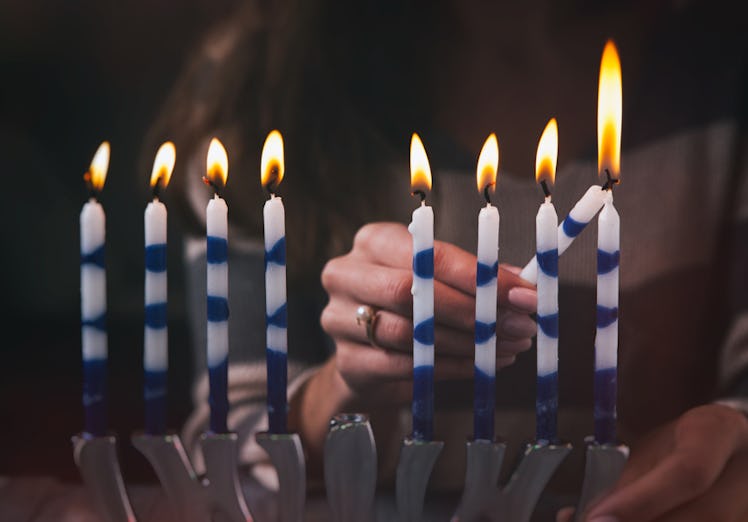
What To Expect From Your First Hanukkah With Your Partner If You've Never Celebrated Before
If you have never celebrated Hanukkah before, the holiday can be downright confusing. There are more misconceptions about Hanukkah then there are days (for the record, it's eight days long). If you are newly in an interfaith relationship and you're wondering how to celebrate Hanukkah for the first time with your partner, now is the time to brush up on your Judaic knowledge. I'm talking about gaining an understanding beyond "it's lit" — though that certainly makes for a solid caption on your Instagram of the menorah. Consider this article a comprehensive beginner's guide to the holiday. I'm here to answer your most burning questions (pun intended) about Hanukkah's eight crazy nights.
As a Jewish kid growing up in the '90s, I'm sure I am not alone in the fact that I first learned the basic story behind this holiday from A Rugrats Chanukah. So, I've decided to employ my pals Tommy, Chuckie, Phil, and Lil to help me explain Hanukkah to you as well.
*Cue Rugrats theme song.*
When is Hanukkah this year?
This year, Hanukkah — also known as The Festival as Lights, not that anyone really calls it that — begins at sundown on Tuesday, December 12. It lasts eight days, concluding at nightfall on Wednesday, December 20. Those who celebrate will light the candles on a candelabra called a menorah (pictured above) for eight nights.
Menorahs have nine candles: one to represent each night of the holiday, plus the tallest one in the middle called the shamash. On the first night, you light the shamash first, then use that to light one other candle. On the second night, you use the shamash to light two more, and so on, until the entire menorah is lit on the last night.
Why does the date change each year?
Hanukkah takes place according to the Hebrew calendar, which is based on the cycles of the moon, rather than the Gregorian calendar (used in the Western world), which is based on the movements of the sun. Hanukkah starts on the 25th day of the Hebrew month Kislev, which means it can occur at any point from late November to late December.
Why do people celebrate Hanukkah?
Hanukkah commemorates a miracle that is said to have taken place in Jerusalem more than 2,000 years ago, when Israel was ruled by the Syrian king Antiochus IV. He made Torah worship (and practicing Judaism in general) illegal, so an old Jewish priest named Mattityahu called upon his sons to fight for the Torah. Judah was named the leader, and his group of Jewish rebel warriors became known as the Maccabees. The Maccabees fought to defeat the Syrians and liberate a holy site in Jerusalem called the Second Temple.
The Maccabees eventually won, restored the Second Temple, and built a new menorah there. They needed to light it, because it was supposed to burn at all times. The story goes that the Maccabees could only find enough oil for the menorah to burn for one day. Miraculously, this drop of oil ended up lasting for eight nights (at which point a new supply of oil became available).
What are common Hanukkah traditions?
You've probably seen the dreidel, or four-sided spinning top, before. This game — which is essentially gambling — has very simple rules. Each side of the dreidel bears a Hebrew letter, which coincides with an action. Nun is a Hebrew letter that stands for the Yiddish word for "nothing," Hei for "half," Gimel for "all," and Shin for "put in." The letters also go together to form an acronym meaning "a great miracle happened there." (In Israel the last letter is different, because it stands for "a great miracle happened here.") Instead of trading real money, it is common to use chocolate coins wrapped in gold foil — also known as gelt, which is the Yiddish word for money.
What foods are eaten on Hanukkah?
Because of the miracle of oil, it is customary to eat foods fried in oil on Hanukkah. Two traditional foods are latkes (potato pancakes) and sufganiyot (Israeli jelly doughnuts). Latkes are commonly served with sides of applesauce and sour cream. Don't knock it 'til you try it.
Does everyone really get eight presents?
Hanukkah is actually a pretty minor Jewish holiday. It's not as religiously significant as Passover or Yom Kippur, so it isn't really comparable to Christmas. Because it takes place during the winter months, however, it has become traditional to give gifts during the eight nights of Hanukkah. This wasn't always the case. Originally, only small amounts of gelt (aka money) were given out on Hanukkah.
Just like on Christmas, these days you can get anywhere from one gift to a dozen. Yes, some families give children a small gift each night, but others prefer to exchange larger presents only on the first night.
What's with all the different spellings?
The Hebrew word "Hanukkah" means dedication. Since it is a Hebrew word, there actually isn't one "correct" translation. In fact, there are a total of 16 different accepted spellings of the word in English. So whether you spell it Hanukkah or Chanukah, you're good.
Hanukkah is a fun holiday that celebrates a miracle involving oil, so yeah, it's pretty lit. Hanukkah Sameach (Happy Hanukkah)!
Check out the entire Gen Why series and other videos on Facebook and the Bustle app across Apple TV, Roku, and Amazon Fire TV.
Check out the “Best of Elite Daily” stream in the Bustle App for more stories just like this!